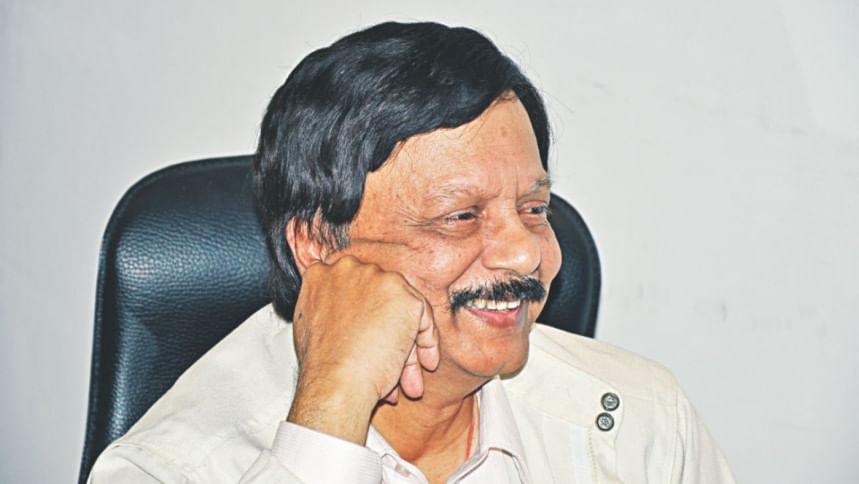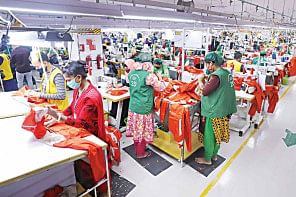Life between Art and War

The cinematic landscape
While studying at Mymensingh Ananda Mohan College, I got into a habit of watching a lot of movies. Back then, we had only two cinema halls in Mymensingh – Chayabani and Alaka. In those days, I used to frequent the movie theatres. Despite my extreme knack for football, I had an unavoidable attraction towards film direction. I was an occasional writer of the entertainment page of The Daily Ittefaq where I wrote and opined about movies, the dilapidated condition of the cinema halls and several other topics regarding cinema. What surprises me till date is, I never yearned to become a film star and even today my actual identity is shadowed by my image as an actor.
Emergence as a political leader
In our time, politics was divided in line with three ideologies. I plumped for the rightist group Chhatra League since communist parties were customarily labelled as atheists and NSF (Pakistan) was the bootlicker of the then Pakistan Government. In 1963, I became the president of Ananda Mohan College committee. I frequently visited Gafargaon which was always in the headline for several proverbial facts. Nure Alam Siddiqui, the late Arif and a lot of other reputed politicians were my close political friends. To be honest, I was imbued with a sense of responsibility and took delight in the journey as a student leader. I was supposed to be the AGS of the central committee of Chhatra League. At that time, I was continuing my studies in Mymensingh henceforth in 1965, K B M Abu Hena got the post. In that following year, I was badly thrashed by the NSF goons. There were quite a few number of non-bailable cases against me but I still sat for the intermediate exam and without any further hassles I enrolled in Dhaka University. Since then, Iqbal Hall became my sacred shelter and political school. During my stay at Iqbal Hall, I was blessed with the affection and political inducement of Obaid bhai, Siraj bhai, Razzak and Syed Mazharul Haque Baki who has been one of the most admired presidents of Chhatra League. The GS of Noakhali Chhatra League ASM Abdur Rob, Mohiuddin of Munshiganj Chhatra League committee, Syed Kamal Ahmed Firu, Masud Parvez and I, had a propensity for fuss against NSF. Khoshru, Montu, Ali Reza, Riazuddin Raju and some other political companions from Jagannath College and other institutions had a regular way into our hall. While all the undaunted brainchildren of Bangabandhu jointly took a hold of the named residence and as well as the entire campus, NSF was appalled at our solidity. Taran, Ibrahim and Aman Gazi from Ruchira group used to join us every other day. It had become a supremely strong and stalwart squad. We were always equipped to jump into any insurgency against the government. The stand of mosquito-net, hockey stick and many other trivial materials were our only weapons. Notwithstanding the fact that we often revolted against the state atrocities and indulged in repeated knockdown blows, we never took anyone's life. Within a few months, I was designated as the AGS of the central committee and Razzak became the general secretary. If I am bound to take one name that inculcated the sense of patriotism and revolution in all of us, I will take the name of Sirajul Islam Khan; no matter how underestimated his contributions have been. We had earned the right to enter Dhanmondi 32, Bangabandhu's place anytime we wanted. His wife was like a mother to us; I would always cherish the love and care she showered on us. At Dhanmondi 32, I met Sheikh Hasina, our honorable Prime Minister who was then an already acclaimed student leader of Badrunnesa College. Her personality was exceptionally polite and amicable which brought her immense popularity among the students. Later on, she expressed her wish of nominating me for MP election, which I had to turn down due to political diplomacy; she was sensible and understood my logical argument. Unfortunately, I could not have contested the election even in the following term since I went to perform the Hajj.
Living in the history-1971
I am not unacquainted with the emotional attachment that the common people of Bangladesh have with our Liberation War. The struggles and tribulations during that heated phase were real and horrifying. I witnessed the war and took weapons in hand. There are still some differences of my outlook on our Liberation War which might set me apart from the majority of the people and their beliefs. The widely accepted hypothesis that the backdrop of this war was our Language Movement of 1952; to me however, the cornerstone of our Liberation War went ahead with the 6 Point Movement. The slogans still give me goosebumps and revive my energies. "Jail er taala bhangbo, Sheikh Mujib ke anbo", still reverberated in my mind. The concealed message was to liberate the country. March 25, 1971 could have been the last day of my life. But my fortune had played its trickery on me and I left the hall to meet a relative. The genocide across the country and inside Dhaka University left the country shuddered. I have an inference that not all of our freedom fighters had flung into the war by virtue of patriotism. Some took part in the struggle owing to their ideology, some fought back as the spunk of revenge was burning inside and some took up arms just deifying the summons of Bangabandhu. The struggle of nine months should not exclude the training period and also the stage when one-sided atrocity by the then Pakistani government shook the tranquility of East Pakistan and the common people were fleeing from here to there.
From Masud Parvez to Sohel Rana
I recovered from the void created by the atrocities committed during the Liberation War. Initially venturing into movies could not ensoul my interest. I had a little experience of working as a producer in Ora Egaro Jon. While looking out for a fresh face to play Masud Rana, for which we had formed a committee of five members, Sumita Debi almost hand-picked me. I was literally puzzled because I was a man with little to no experience of working in the industry. Mustafiz bhai, editor of Chaitali, and Ahmed Zaman Chowdhury gave me a new name with the new identity 'Sohel Rana'.
Devotion to direction
I am a simple man with episodes of satisfactions and dissatisfactions. In my directorial life, some scenes brought me a whole other level of satiety. A tragic scene in my film Maroksha tears me apart even today. I made a psychological film Jibon Nouka that portrayed the human nature of love, betrayal and disbelief. One of my university professors had greatly felicitated my idea of bringing such a psychological story on cinema screen that too so credibly.
Dipped in despair
During the mass uprising in 1969, the first seven citizens that defied the section 144 were Firu, Nazim Kamran Chowdhury, Mrinal Sen, three more of my companions and I, Masud Parvez. But we are never remembered in the history. Even history has betrayed us. On the premises of FDC, I undertook the project of making a monument with my own money putting myself in jeopardy. In that monument, the name of architect Mohiuddin Faruk is mentioned, but mine is not. I received the national award for Ajante and Sahoshi Manush Chai. I got the award in the 'Best Actor in a Supporting Role' category for Sahoshi Manush Chai; whereas in that cinema I played the hero and not the supporting role. As a freedom fighter, I never received the proper recognition and respect that I deserved. I expected at least a special card that would acknowledge our identity and dignify our sacrifices for the country. In the extravagant award functions I am asked to sit in the back row. These little incidents put a damper on me. I have gradually secluded myself in a huff.
The unseen nook
I wrote four thrillers many decades ago. Very few people have come to know that. Mrityu Bhoyongkar, Duster Moru and two other books. I was one of the co-founders of Bangladesh Producers' Association, Bangladesh Directors' Association and Bangladesh Artists' Association. I had founded the Bangabandhu Cultural Society, at a time when the country was under an extremely authoritarian regime when even the name of Bangabandhu could pose a threat to a common man. Sometimes, just the thought of our political situation drags me in a bottomless pit of depression.
A transition curve
Our youngsters are simultaneously brilliant and insensitive. When they mourn, they cannot cry their heart out; when they laugh, the laughter is not mirthful. They are dipped in distortions. I myself never idolized anyone in my life and rather wanted to assert all the eternal human qualities in me. Even today, the only entity I yield to is Allah.

 For all latest news, follow The Daily Star's Google News channel.
For all latest news, follow The Daily Star's Google News channel. 



Comments